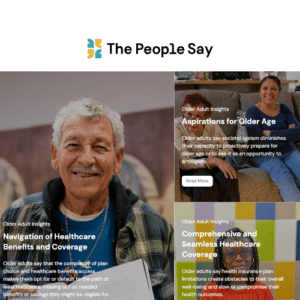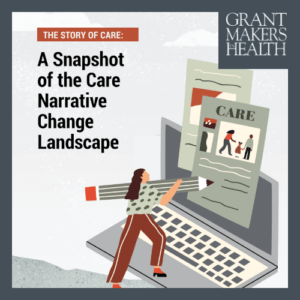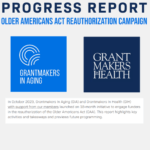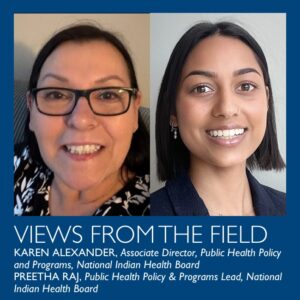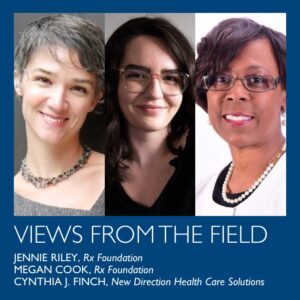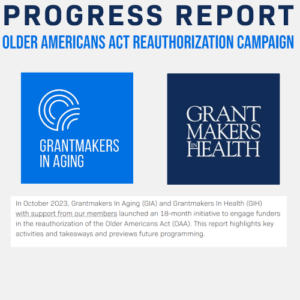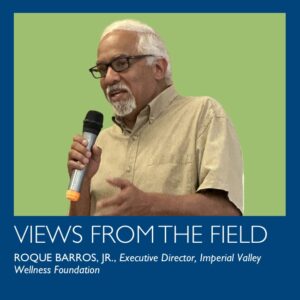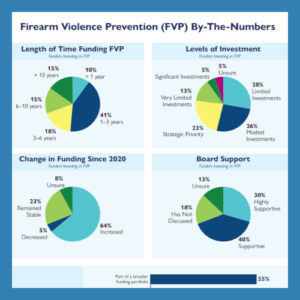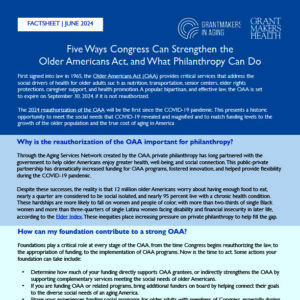Featured Resources
The People Say: A New Older Adult and Caregiver Policy and Research Tool
An online research hub features first-hand insights from older adults and caregivers on the issues most important to them, as well as feedback from experts on policies affecting older adults. The project particularly focuses on the experiences of communities often under-consulted in policymaking, including older adults of color, those who are low income, and/or those who live in rural areas where healthcare isn’t easily accessible.
The Story of Care: A Snapshot of the Care Narrative Change Landscape
At some point, every one of us will need care or need to provide care. The COVID-19 pandemic put a spotlight on the extraordinary contributions of caregivers and exposed the failings caused by our nation’s lack of care policies, especially for communities of color. Deploying narrative-change strategies across care-related issues will help create the conditions for cultural and policy progress. The goal of this report is to share with funders the promising narrative-change strategies and tactics that have been identified, a directory of funders and grantees who are supporting this work, and how philanthropy can best support this effort.
GIH Advocacy for the Reauthorization of the Older Americans Act (OAA)
The OAA provides critical services that address the social drivers of health for older adults. If the OAA is not reauthorized, it is set to expire on September 30, 2024. Grantmakers In Health (GIH) and Grantmakers In Aging (GIA) announced a partnership last year to engage funders in advancing the reauthorization of this critical piece of legislation.
OAA News and Updates
In October 2023, Grantmakers In Aging (GIA) and Grantmakers In Health (GIH) launched an 18-month initiative to engage funders in the reauthorization of the Older Americans Act (OAA). This report highlights key activities and takeaways and previews future programming.
Download the Report →Explore Population Health Topics
Latest Resources
Race to the Top: Is Children’s Health in the Running?
The Race to the Top-Early Learning Challenge (RTTELC), jointly administered by the U.S. Departments of Education, and Health and Human Services, is the latest federal opportunity for states to receive grants to transform education systems and improve achievement outcomes for children.
Health Care Reform: Promises and Pitfalls for Maternal and Child Health
In 2009 health care spending in the United States reached an all-time high of nearly $2.5 trillion, representing an almost two-fold increase in spending on a per capita basis since 1997 (NIHCM Foundation 2011).
Promoting Family-Centered Care for Children with Special Health Care Needs
There are approximately 10.2 million children in the United States with special health care needs, which translates into one out of every five households (MCHB 2007).
Access to Care for the Categorically Ineligible
Although the Affordable Care Act (ACA) will expand health care coverage to 32 million Americans (CBO 2010), many states remain concerned about providing their residents access to clinical and preventive services.
Paving the Way for Change: Implementing CLASS
The historic passage of the 2010 Patient Protection and Affordable Care Act was in many ways a homerun for health advocates who have been working toward meaningful reform for decades. The new law lays the groundwork for sweeping changes in the American health care system, expanding access, coverage, and personal responsibility for care suited to individual needs.
Publications and Reports
2024 Survey Summary: Firearm Violence Prevention Strategies
GIH conducted a survey in September 2024 about funder engagement in firearm violence prevention. This fact sheet summarizes the survey results with a total sample of 81 health funders. This public health crisis and social justice issue is preventable, and health funders have an important role to play in advancing firearm violence prevention efforts.
Progress Report: Older Americans Act Reauthorization Campaign
In October 2023, Grantmakers In Aging (GIA) and Grantmakers In Health (GIH) launched an 18-month initiative to engage funders in the reauthorization of the Older Americans Act (OAA). This report highlights key activities and takeaways and previews future programming.
Fact Sheet: Five Ways Congress Can Strengthen the Older Americans Act, and What Philanthropy Can Do
First signed into law in 1965, the Older Americans Act (OAA) provides critical services that address the social drivers of health for older adults such as nutrition, transportation, senior centers, elder rights protections, caregiver support, and health promotion. A popular, bipartisan, and effective law, the OAA is set to expire on September 30, 2024, if it is not reauthorized. Foundations play a critical role at every stage of the OAA, from the time Congress begins reauthorizing the law, to the appropriation of funding, to the implementation of OAA programs. Now is the time to act.
Connect With Funder Peers on Population Health
Interested in exchanging strategies, information, and questions with your funder peers? Sign up for GIH E-Forums.


